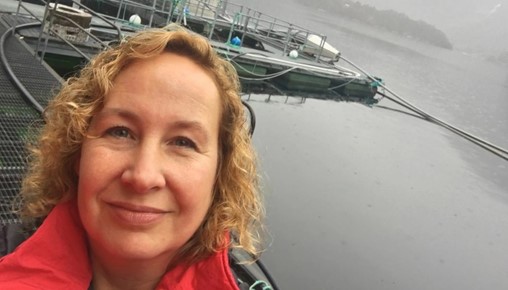Interview with Tonje Osmundsen
Tonje C. Osmundsen is a research professor at NTNU Social Research. From a political science perspective, she is involved in research on the salmon aquaculture industry and public regulation, and has published extensively in renowned international journals.

What inspired you to become involved in aquaculture?
I got excited about researching the industry and the public regulation of aquaculture when back in 2005 I got involved in a research project where we were looking into the significance of the industry in local communities along the coast. I then realized there was not much research on such topics, not in Norway or elsewhere. I have since then studied many topics on the interaction between the aquaculture industry and society, aiming to contribute to making the industry a more positive actor ‘of and in society’.
Briefly describe your aquaculture career
After doing a PhD in political science on the effect of globalization on Norwegian businesses, I started a position as a researcher at a research institute, where I still work. To have a successful career in research being able to obtain funding for your project is, of course, crucial. There were few funding opportunities for the topics I researched in my PhD, and I had to find other sectors and topics that were both interesting and which had funding opportunities. Over the past 18 years I have applied for funding for aquaculture related projects, sometimes successfully and sometimes not, and been involved in research projects on many different aspects of aquaculture. Seven years ago I reduced my research work to 50% in order to head the department. It is important for me to still be able to work with research, while I also find the role as research director interesting and challenging.
Which individuals or organisations in aquaculture have you found particularly inspirational?
Alongside numerous individuals in industry and academia who devote their energy to contribute to improving how we produce food and interact with nature, representatives of NGOs such as Bellona and the WWF in particular stand out. In heeding the ambitions of their organizations, they have impressed me with their insights of how to move forward while being very conscious of both negative and positive aspects of this growing industry.
How important has networking been to your career?
Unfortunately, I am not very fond of networking as such, I wish I was better at small talk, but I do love to engage with people on a more substantial basis, when we have a shared interest in solving something together. Through the years I have been fortunate to work with many people both in Norway and abroad, and I feel that what has been most important for my career has been to collaborate with as many as possible; doing projects, writing articles, and organizing seminars together with others. And in such work, to always pursue an inclusive stance inviting others in to collaborate.
During your career, have you noticed inequalities in the sector, be it in policies or culture? If yes, what actions do you think would best address those issues?
I think one would be blind to not notice the gender gap in the sector, it is sufficient to be present at an industry conference. However, this has changed a lot in the past years, especially in academia. In the industry itself it’s a bit slower, and the blue suits are still very dominant. Besides gender issues, there are also inequalities in terms of how business and financial perspectives dominate the board rooms of the industry, leaving biological perspectives to matter at lower levels of the organizations. To address such issues, I think it is important that regulations have equal representation in the boardroom; some of these changes actually need to be forced when the gate keepers are reluctant to change. But I also think that there will be changes as generations shift and younger people come in. As for the down-prioritising of fish welfare and biological knowledge, I believe there is a rising pressure now which requires changes in the extent of mortality in production, and improved fish welfare.

What is your proudest aquaculture-related achievement to date?
This is a difficult question, but I think I am most proud each time a new article, co-authored with excellent scientists from other disciplines, is published. It gives me joy as it is the result of hard work finding the right research questions, gathering data, analysing and disseminating our results. Even though I am aware that one should be realistic about how much impact an article is able to make, it is still an important part of disseminating and building knowledge, brick by brick. I am proud to be a part of that.
What advice would you give to someone (man or woman) looking to start a career in the aquaculture sector, or progress their existing career?
I would recommend anyone to do so, the aquaculture sector is a very interesting and promising sector for the future. And my advice would be to keep an open mind and be curious of other disciplines and perspectives. We are still just at the infancy of this industry, and in the years to come we will learn and develop so much more. However, this will not be gained if we as researchers stay in our silos, but only when work is interdisciplinary and if we engage with the industry itself and its many stakeholders.
What do you think will be the key drivers/areas for innovation for Scottish aquaculture in the next decade?
In the next decade I believe we will see that sustainability issues are moving even further up on the agenda, including an increased understanding of how to ensure good animal welfare. This will create a pressure for improved production practices and technologies, as well as appropriate and efficient public regulation of the industry. These are important issues to solve as the role of aquaculture is becoming increasingly crucial for the future of food supplies globally.
Read more interviews
